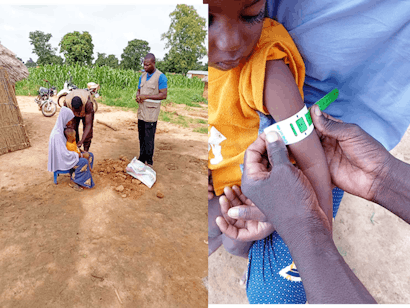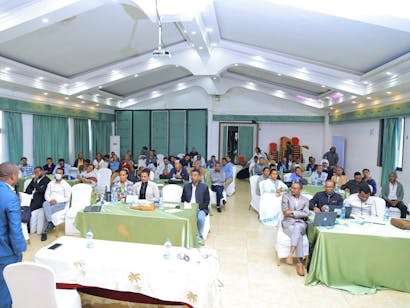From Surviving to Thriving: A Journey to Food and Nutrition Security in Karamoja

In Karamoja, northeastern Uganda, household food insecurity remains a pressing development challenge. Yet through community-based approaches that integrate agriculture, nutrition, and gender, tangible progress is being made. Nakor Christine, a mother of five from Nadiket village in Moroto district, illustrates how practical training, improved practices, and shared responsibility can transform both livelihoods and family well-being.
Building Knowledge and Shifting Practices
Before 2023, Nakor Christine faced several challenges common among rural households. Her farming practices were inefficient—seeds were planted without proper spacing, leading to low yields. Meals at home were often nutritionally inadequate, and one of her children had recently been enrolled in a nutrition supplementation programme. Decision-making in the household rested solely with her husband, while Christine carried most of the caregiving and labour responsibilities.
Her situation began to change in March 2023, when her farmer group, Etata Obara, joined the CASCADE (Catalyzing Strengthened Policy Action for Healthy Diets and Resilience) program. Delivered through the Farmer Field Business School (FFBS) model, CASCADE provided training on:
- Climate-smart agriculture
- Nutrition-sensitive farming
- Social Action Analysis (SAA)
- Engaging Men and Boys (EMB) for more equitable household roles
The sessions introduced improved farming techniques and promoted the cultivation of nutrient-dense crops such as iron-rich beans, orange-fleshed sweet potatoes (OFSP), and Vitamin A-rich maize. Cooking demonstrations based on the 5-finger model encouraged participants to prepare balanced meals using locally available foods.
Applying New Skills for Nutrition and Income
With these tools and knowledge, Christine began applying new approaches to food production and household nutrition, and the results were evident within a few months. Christine’s backyard garden now produces a wide variety of vegetables, including cowpeas, tomatoes, okra, sukuma wiki, and eggplants. She also planted fruit trees and began rearing chickens to further diversify her family’s diet.
Working with her group, she established vegetable plots along a nearby riverbank, supplying produce to local markets. Weekly sales now earn her approximately UGX 20,000 (around $5.40). During a cooking demo, she sold OFSP worth UGX 100,000 (about $27). In early 2024, she harvested 175 kg of Vitamin A maize, of which 75 kg was reserved for replanting and shared with neighbours, while the rest was used for family consumption.
Christine also participates in group savings, helping her household manage resources more effectively and plan for future investments.

Fostering Shared Roles and Long-Term Impact
Beyond food and income, Christine’s household dynamics have shifted. Thanks to the EMB component of CASCADE, her husband now supports household tasks and includes her in decision-making.
“I am living in a happy family because my husband and I consult each other,” she noted with a smile.
Christine now plans to expand her production of vegetables, OFSP, Vitamin A maize, and iron-rich beans. She also hopes to support other women in her community to adopt similar practices.
Her experience reflects the potential of integrated, community-led models that prioritise practical knowledge, gender inclusion, and local ownership. It demonstrates how empowering women like Christine can lead to healthier families, more resilient livelihoods, and stronger communities.
About the Author
Julius Esanyu is a Program Coordinator with experience in agriculture, food security, and rural development. He works with farmer groups in Uganda to advance climate-resilient, nutrition-sensitive livelihoods.
Connect on LinkedIn


